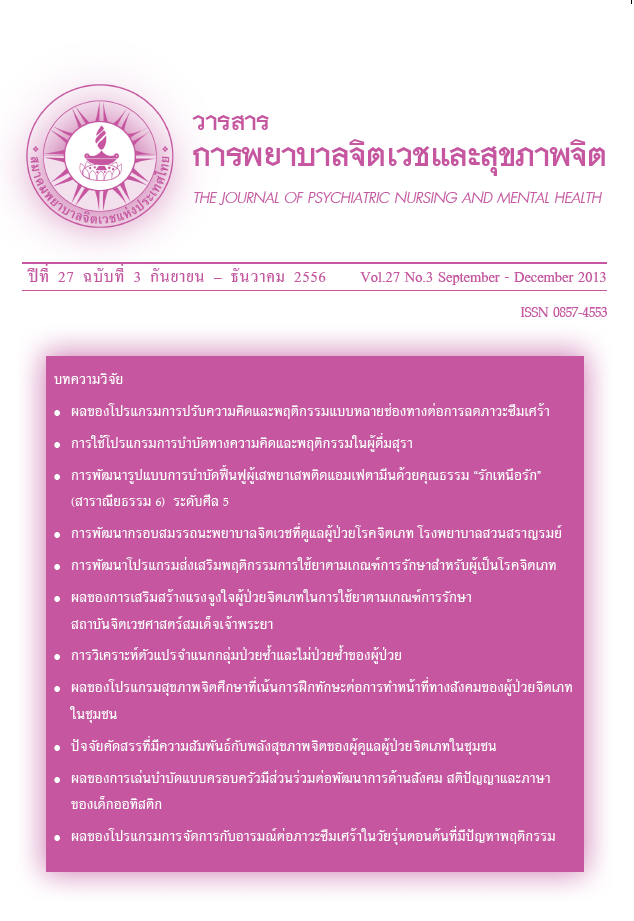การวิเคราะห์ตัวแปรจำแนกกลุ่มป่วยซ้ำและไม่ป่วยซ้ำของผู้ป่วยจิตเภทไทยมุสลิม
Main Article Content
บทคัดย่อ
การวิจัยเชิงบรรยายเรื่องนี้ มีวัตถุประสงค์ คือ เพื่อวิเคราะห์ตัวแปรและลำดับความสำคัญของตัวแปร ได้แก่ อายุ ระดับการศึกษา ความเพียงพอของรายได้ สถานภาพสมรส พฤติกรรมการดูแลตนเอง การปฏิบัติศาสนกิจตามหลักปฏิบัติในอิสลาม พฤติกรรมการใช้ยา กิจวัตรสุขภาพครอบครัว การสนับสนุนทางสังคม และการแสดงออกทางอารมณ์ในครอบครัวที่สามารถจำแนกกลุ่มป่วยซ้ำและไม่ป่วยซ้ำของผู้ป่วยจิตเภทไทยมุสลิม กลุ่มตัวอย่างคือผู้ป่วยจิตเภทไทยมุสลิม จำนวน 220 คน แบ่งเท่ากันเป็นกลุ่มป่วยซ้ำและไม่ป่วยซ้ำ เครื่องมือที่ใช้ในการวิจัยคือ แบบสัมภาษณ์ข้อมูลทั่วไป แบบวัดพฤติกรรมการดูแลตนเอง แบบประเมินการปฏิบัติศาสนกิจตามหลักปฏิบัติในอิสลาม แบบวัดพฤติกรรมการใช้ยา แบบวัดกิจวัตรสุขภาพครอบครัว แบบสัมภาษณ์การสนับสนุนทางสังคม และแบบวัดการแสดงออกทางอารมณ์ในครอบครัว เครื่องมือทุกฉบับผ่านการตรวจสอบความตรงตามเนื้อหาจากผู้ทรงคุณวุฒิ จำนวน 8 ท่านมีค่าความเที่ยงดังนี้ .98, .98, .96, .92, .95 และ .96 ตามลำดับ สถิติที่ใช้ในการวิเคราะห์ข้อมูล คือการวิเคราะห์ด้วยสถิติการถดถอยโลจิสติก (Logistic regression analysis)
ผลการวิจัยสรุปได้ดังนี้ ตัวแปรที่สามารถจำแนกการป่วยซ้ำและไม่ป่วยซ้ำของผู้ป่วยจิตเภทไทยมุสลิมได้อย่างมีนัยสำคัญทางสถิติที่ระดับ .001 มีจำนวน 1 ตัวแปรคือ พฤติกรรมการใช้ยา (Exp (B)=2.042) และสมการถดถอยโลจิสติกดังนี้ Log (odd ratio) = -38.046 + .714 (drug) ซึ่งสมการมีประสิทธิภาพในการทำนาย โดยภาพรวมได้อย่างถูกต้องคิดเป็นร้อยละ 97.3 โดยสามารถทำนายกลุ่มป่วยซ้ำได้อย่างถูกต้อง ร้อยละ 96.4 และสามารถทำนายกลุ่มไม่ป่วยซ้ำได้อย่างถูกต้องร้อยละ 98.2
Abstract
The purpose of this descriptive research was to analyze and rank the following variables, i.e., age, education, adequacy of income, marital status, self-care behaviors, Muslim practices, medical adherence behaviors, family health routines, social support, and family expressed emotion, which were able to discriminate relapse and non-relapse among Thai Muslim schizophrenic patients. 220 Subjects were Thai Muslim schizophrenic patients. They were equally divided into two groups, 110 relapse and 110 non-relapse. Research instruments were: demographic interview guide and 6 scales designed to measure self-care behaviors, Muslim practices, medication adherence behaviors, family health routine, social support, and family expressed emotion. All instruments were reviewed for content validity by eight experts. Their reliability were .98, .98, .96, .92, .96 and .96, respectively. Data were analyzed by Logistic regression.
Major result was that one variable which was medication adherence behaviors could significantly discriminated relapse and non-relapse among Thai Muslim schizophrenic patients, at the .001 level (Exp (B) = 2.042). The logistic response formula was: Log (odd ratio) = -38.046 + .714 (drug). This formula correctly predicted overall success rate of 97.3, where by correctly predicted 96.4 percent of the group of relapse and correctly predicted 98.2 percent of non- relapse Thai Muslim schizophrenic patients
Article Details
บทความที่ได้รับการตีพิมพ์แล้ว เป็นลิขสิทธิ์ของสมาคมพยาบาลจิตเวชแห่งประเทศไทย


